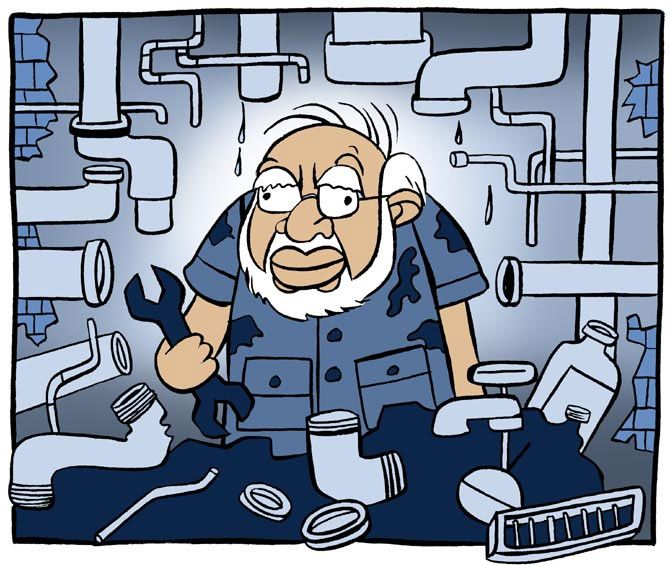The incoming government will have to encourage private investments, bring down cost of capital
Illustration: Uttam Ghosh/Rediff.com

The Narendra Modi dispensation has little time to celebrate the landslide win in the Lok Sabha election as it will have to immediately address challenges facing the economy, which is witnessing a slowdown.
While the economy is stuck at 7-7.2 per cent growth for the last two financial years, and is not expected to grow any better this time, the government found hard to meet the fiscal deficit target of 3.4 per cent for FY19.
The challenge now is to turn around the economy in these circumstances.
The incoming government is set out to stamp its reform agenda fast, with the buzz that an informal cabinet meeting could be held as early as Friday.
Even before the voting had ended, the Prime Minister’s Office had directed all departments to come up with a ‘100-day plan’, listing all the steps and reforms that could be taken over the next coming days.
The finance ministry has also listed such steps that can be carried out.
“The past five years were about cleaning up and consolidating the system. The next five years will be about growth and unshackling the system,” said a senior finance ministry official a day before the results.
The government will have to create condition for perking up private investments in the economy.
After measures such as Insolvency and Bankruptcy Code, and other steps to clean up the banks, the government is expected to take a few more steps to further bring down the cost of capital to boost investment, an official said.
Encouraging private investments requires that fiscal deficit is kept under check so that resources are not crowded out.
William Foster, vice-president of Moody's Investors Service, said: “At this stage, we expect the broad push towards fiscal consolidation to remain, although with greater policy emphasis on supporting low incomes.”
There are different views as well. D K Srivastava, chief policy advisor at EY, said the Centre should set up a counter-cyclical fund and let fiscal deficit widen up to 1.5 percentage of GDP at the time of a slowdown.
Shubhada Rao, chief economist at YES Bank, said: "With political and policy continuity in place, it is imperative that the central government steps up spending so as to unlock the flow of resources to the rest of the economy."
As the economy faces muted rural consumption, financial services firm Nomura suggested that the Pradhan Mantri Kisan Samman Nidhi Yojana reach every farmer.
The interim Budget for FY20 had provided for Rs 6,000 a year to all farmer families owning up to two hectares of land in three phases a year.
This would cost the exchequer just Rs 12,000 crore over the current Rs 75,000 crore a year, since 86 per cent of farmers families have been covered under it.
Nomura also suggested the government not to go for farm-debt waiver but focus on easier and cheaper access of credit to farmers.
The BJP promised in its manifesto zero-interest loans of up to Rs 1 lakh to farmers for five years.
Currently, the government bears a burden of Rs 15,000 crore a year to enable farmers get crop loans at 3 per cent.
If 3 per cent additional subvention is given, the burden would increase to Rs 30,000 crore.
CRISIL said as consumer demand improves gradually, capacity utilisation will increase and private investments in select sectors would inch up.
But a material change in the private capex cycle is unlikely this fiscal due to ongoing deleveraging, it said.
The government’s promise that it will make capital investment of Rs 100 trillion in the infrastructure sector by 2024 is too much of an ambitious task.
The total capital expenditure is estimated at Rs 9.61 trillion for FY19 (revised estimates).
This is projected to decline marginally to Rs 9.53 trillion in the Budget Estimates for 2019-20.
To take this to Rs 100 trillion, or over 10 times, is a tall order.
Neeru Ahuja, partner at Deloitte, said: “We look forward to a new direction and fresh ideas from the next finance minister leading to an easier and simpler direct tax regime.”
On indirect tax front, the issue of simplification of GST returns is in the works.
But the task lies more between the Centre and states.
There is also talk of beginning judicial reforms after discussions with the judiciary.
This is at the heart of everything that the PM hopes to do in the second stint.
Even pending initiatives such as land reforms cannot be carried forward until judicial reforms happen, said an official.
The government has bitten the bullet on bank mergers.
It will now be expanding it to create economies of scale.
Some banks are being considered for merger. Punjab National Bank and Canara Bank could merge with themselves smaller banks.
Soumya Kanti Ghosh, chief economic advisor at the SBI group, said it is better to start early.
On other banking reforms, Madan Sabnavis, chief economist at CARE Ratings, said the banking sector is going through challenges of capital and asset quality; and while the latest results do indicate that the worst may be over, the government should do a full review of the banking sector and address the challenges of provision of capital, removal of banks from PCA framework, asset quality recognition etc.
With the Opposition far weaker in the Lok Sabha now, the government can initiate reforms on combining labour laws into four codes.












 © 2025
© 2025